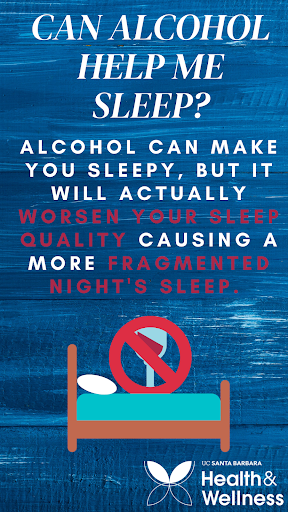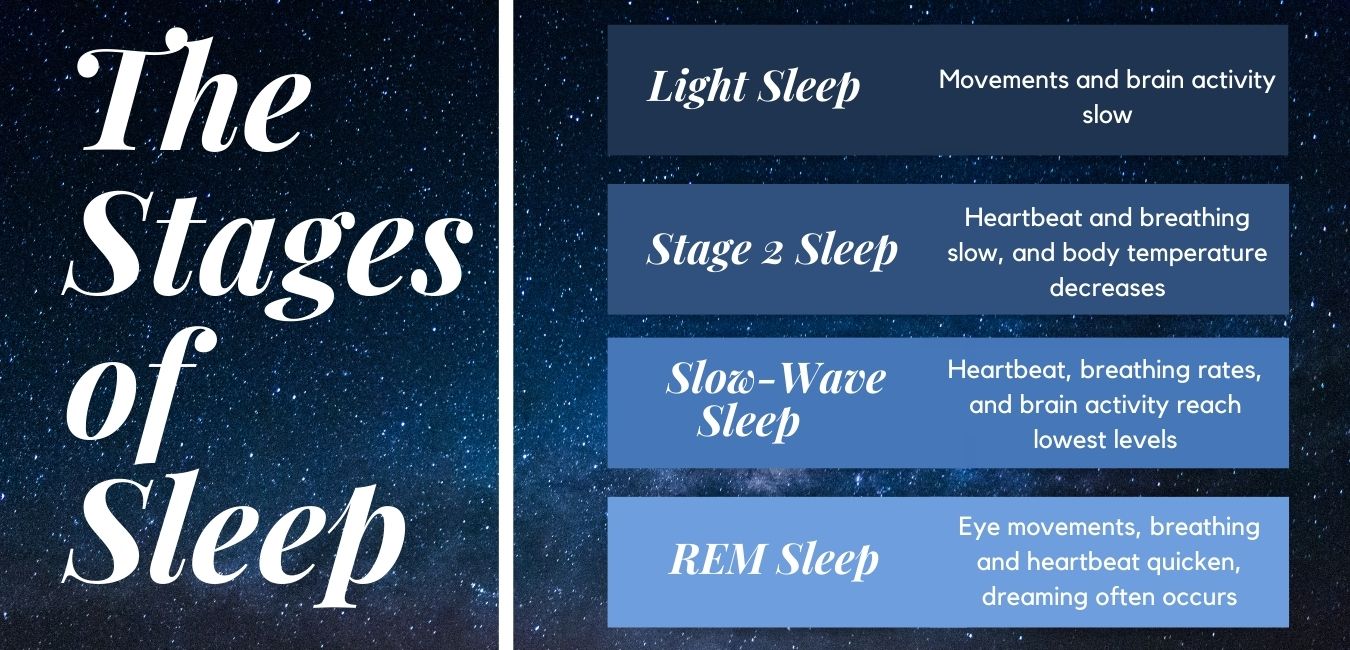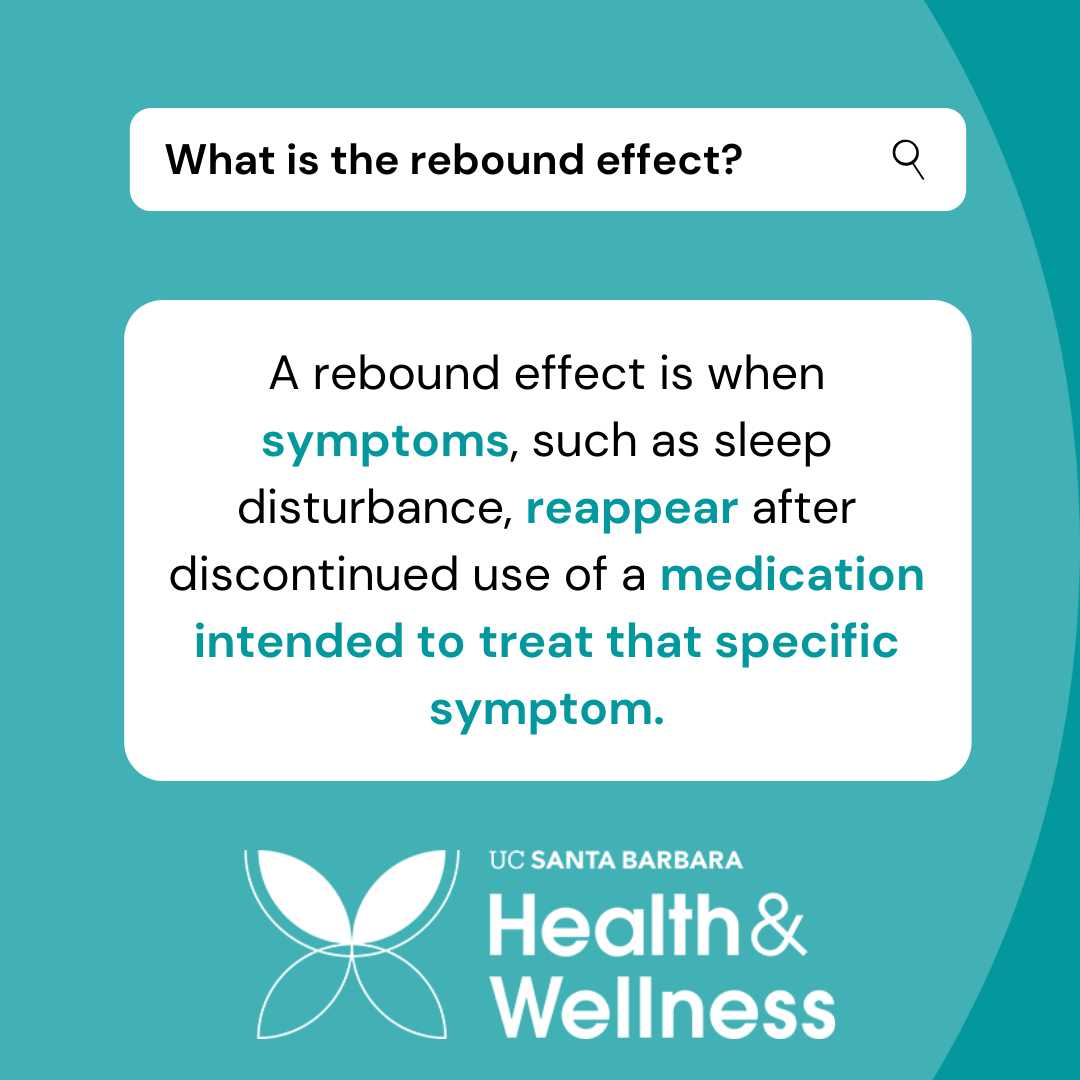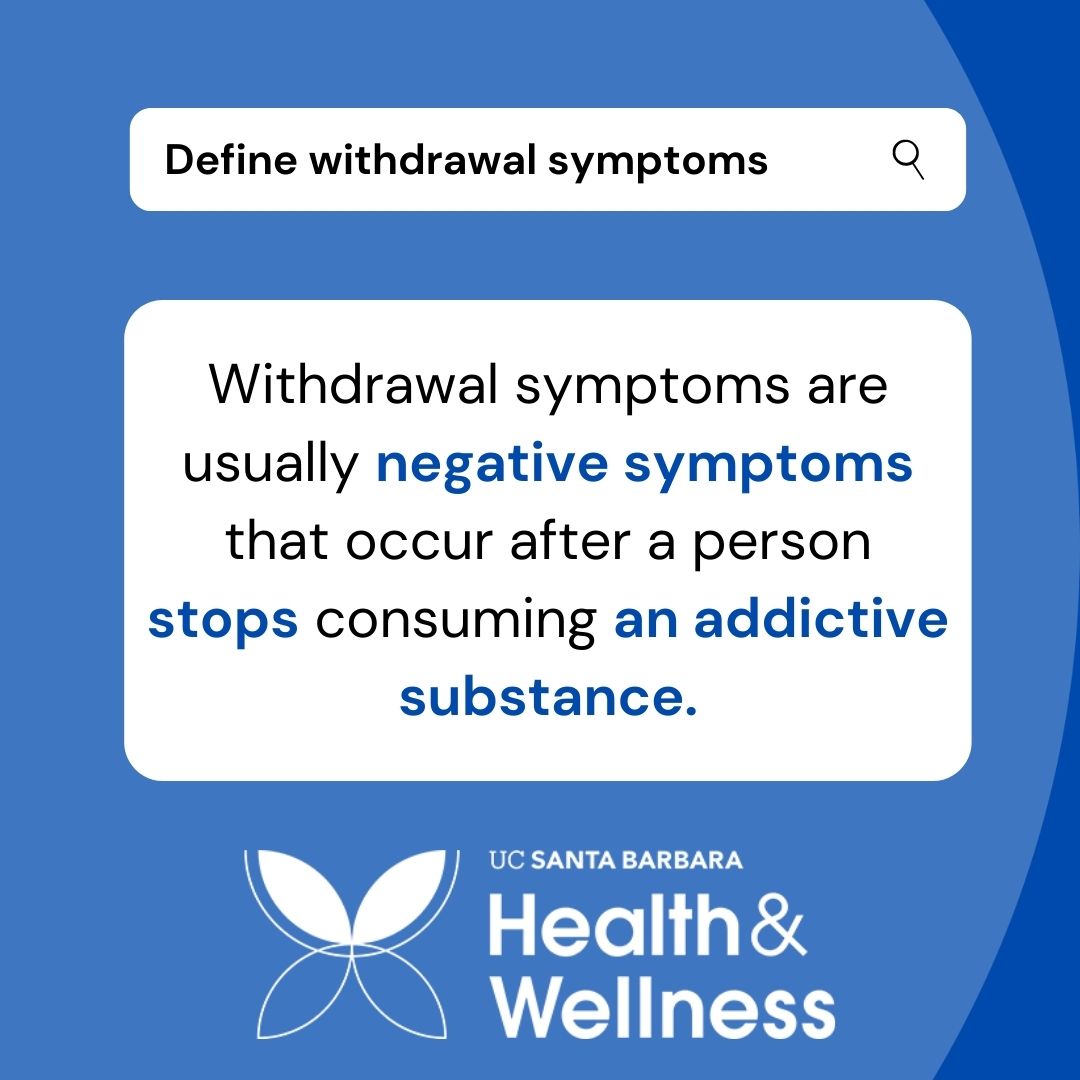
If you are someone you know is struggling with addiction, please reach out to the Alcohol and Drug Program at UCSB: https://adp.sa.ucsb.edu/home. They offer free counseling to students as well as workshops and support groups. For information on ADP contact: (805) 893-5013 or adp@sa.ucsb.edu.
Alcohol

The relationship between alcohol and sleep can be confusing. You might have experienced the sedative effects of alcohol, which on the surface, seem like they would be helpful in falling asleep. However, alcohol actually tricks your body into falling into deep sleep faster than it normally would, which in turn messes with the natural rhythm of your nightly sleep cycles.
Alcohol is a central nervous system depressant, which can result in a fast onset of sleep. Many drinkers experience falling into deep sleep shortly after getting into bed. Sounds great right? Not so much. Our sleep cycles are laid out in an orderly fashion and each plays an important role in restoring and regenerating our body and mind overnight. To understand how alcohol would have a negative impact on the sleep cycles, we have laid out what a normal night would look like:
Stage 1: Light sleep - transition stage when you start to nod off, movements and brain activity slow.
Stage 2: Longest of the four cycles - heartbeat and breathing continues to slow, body temperature decreases as you head towards deeper sleep.
Stage 3: Slow Wave Sleep - heartbeat, breathing rates and brain activity reach lowest levels.
Stage 4: Rapid Eye Movement (REM) - Eye movements, breathing and heartbeat quicken, dreaming often occurs. This is a very important stage in consolidating memories!
If we initially speed through the first two sleep cycles, this set up an imbalance for the rest of our night. Studies show that drinking before bed can lead to more time spent in slow-wave sleep and less in REM. With potential for more sleep disruptions and overall, shorter sleep duration, this will result in a night of decreased sleep quality.
National Sleep Foundation. (2020, September 4). How Alcohol Affects the Quality-And Quantity-Of Sleep. Retrieved September 2020, from https://www.sleepfoundation.org/articles/alcohol-and-sleep

In research with young adults, a statistically strong relationship between sleep problems and binge drinking has been found. It is important to note that researchers saw a dose-response relationship. Meaning, those who engaged in binge drinking (both increasing the amount and frequency) dramatically increased the negative effects on their sleep. After a night of binge drinking, you're likely to wake up dehydrated and sleep-deprived. It is best to regulate your amounts and stop drinking at least 4 hours before bedtime, giving your body time to metabolize the alcohol before sleep. If you are having trouble with feeling rested in the morning after drinking, consider cutting down the amount and frequency or check in with your healthcare provider.
Popovici, I., & French, M. T. (2013). Binge drinking and sleep problems among young adults. Drug and alcohol dependence, 132(1-2), 207-215.
Stein, M. D., & Friedmann, P. D. (2006). Disturbed sleep and its relationship to alcohol use. Substance abuse, 26(1), 1-13.
Alcohol is not the only commonly used substance people have found has a tricky relationship with sleep. Especially since its legalization, marijuana has become a frequent topic of conversation. Is it good for you? Is it bad for you? Can it help with my anxiety? And, of course, can it help me sleep better? Unfortunately, much research still needs to be done to give the same concrete answers to these questions as we have for alcohol. The following module outlines the preliminary knowledge coming from research thus far. As with all the Sleep Challenge content, this is meant to be an educational resource, not a catch-all conclusion. Please talk to your healthcare provider for any personal behavioral recommendations.
Marijuana
Defining Terms:
Endogenous endocannabinoid system: a bodily system whose main job is to maintain homeostasis of various bodily functions
Homeostatic levels: bodies natural level/ normal level of any process that's occurring
Sleep latency: how long it takes one to fall asleep
In an effort to understand how cannabis affects sleep, it’s helpful to look at how it affects the body. The endogenous endocannabinoid system is one of our oldest human systems, having evolved over 500 million years ago. It plays an important role in the central nervous system, and functions mainly to maintain homeostatic levels of different bodily functions and processes . It does so mainly through its cannabinoid receptors: CB1(most abundant) and CB2 receptors. There are several other receptors, but these are the main ones in the system regulating a multitude of different physiological aspects, including sleep! Lipids interact with these receptors to induce sleep. Similarly, delta9-THC and CBD can interact with the CB1 and CB2 receptors respectively as well. Whether they act as inducers or inhibitors of sleep is still relatively new to the field of research, preliminary research displays both sides of the spectrum.
Murillo-Rodríguez E. The role of the CB1 receptor in the regulation of sleep. Progress in Neuro-psychopharmacology & Biological Psychiatry. 2008 Aug;32(6):1420-1427. DOI: 10.1016/j.pnpbp.2008.04.008.
If we begin to look in the literature, it is easy to see that the research on how marijuana use affects one’s sleep is incredibly variable (Gates, Albertella, & Copeland, 2014). In 2014, A group of researchers conducted a systematic review of the research in this area using 39 publications and found that the studies they reviewed failed to address a large number of biases in the methodology of their studies (Gates, Albertella, & Copeland, 2014). Thus, at this point in time it is difficult to make a broad, encompassing statement on exactly how marijuana affects sleep. With this in mind, several literature reviews of the studies conducted on marijuana and sleep have found that chronic marijuana use for a long period of time seems to decrease the positive effects of cannabis on sleep, such as decreased sleep latency after use (Angarita, Emadi, Hodges, & Morgan, 2016; Schierenbeck, Riemann, Berger, & Hornyak, 2008). This means that after chronic use, marijuana may no longer help facilitate a faster transition to sleep.
Furthermore, the research on effects of marijuana cessation on sleep has a slightly clearer trend in the research, although the explanation for the trend is more unclear. The National Institute on Drug Abuse states that sleeplessness is a common withdrawal symptom for long-term marijuana users that stop using cannabis (NIDA, 2020). Other studies on marijuana cessation have also found that sleep disturbances, particularly by those who are chronic users, occur shortly after they stopping use (Conroy, & Arnedt, 2014; Angarita, Emadi, Hodges, & Morgan, 2016; Schierenbeck, Riemann, Berger, & Hornyak, 2008). It should be noted that it is still unknown as to whether sleep disturbance occurs after cessation because of withdrawal or because of a “rebound effect.” A rebound effect is when symptoms, such as sleep disturbance, reappear after discontinued use of a medication intended to treat a target symptom. This may contribute to the problems with sleep disturbance after cessation. Studies have shown that having sleep disturbances makes one more likely to use marijuana in the first place, thus allowing one to infer that marijuana was is used as a type of sleep aid for some which could result in a rebound effect (Conroy, & Arnedt, 2014; Angarita, Emadi, Hodges, & Morgan, 2016).
It should be noted that due to the variability in research, this section was written based on literature reviews, which encompass many different studies from the marijuana and sleep literature. A literature review is a review of the main points in a specific field in research, using the information available from multiple different experiments.
Angarita, G. A., Emadi, N., Hodges, S., & Morgan, P. T. (2016). Sleep abnormalities associated with alcohol, cannabis, cocaine, and opiate use: a comprehensive review. Addiction science & clinical practice, 11(1), 1-1
Conroy, D. A., & Arnedt, J. T. (2014). Sleep and substance use disorders: an update. Current psychiatry reports, 16(10), 487.
Gates, P. J., Albertella, L., & Copeland, J. (2014). The effects of cannabinoid administration on sleep: a systematic review of human studies. Sleep medicine reviews, 18(6), 477-487.
NIDA. 2020, July 24. Marijuana DrugFacts. Retrieved from https://www.drugabuse.gov/publications/drugfacts/marijuana on 2020, August 17
Schierenbeck, T., Riemann, D., Berger, M., & Hornyak, M. (2008). Effect of illicit recreational drugs upon sleep: cocaine, ecstasy and marijuana. Sleep medicine reviews, 12(5), 381-389.


CBD
Compounds called cannabinoids within the cannabis plant cause the psychoactive effects we associate with marijuana. THC and CBD are two of the most common cannabinoids. Unlike THC, CBD is non-impairing and will not get you high. CBD is commonly used in the treatment of anxiety, and pain, and in some cases is recommended as a sleep aid. Results from one study indicate that CBD dosages of 160 mg lengthened sleep duration compared to both a placebo and insomnia drug nitrazepam.
Cortisol, a stress hormone, typically peaks in the morning. However, some people with insomnia have higher cortisol levels at night, which is associated with more awakenings. Another study showed a correlation between the decrease of cortisol at night after ingestion of 300 and 600 mg of CBD oil, suggesting that CBD affects the release of cortisol. However, according to a follow-up study, the benefits of CBD for insomnia treatment may decrease over time.
Caporuscio,, J. (2020, June 3). CBD and sleep: Does CBD work as a sleep aid? Medical News Today. Retrieved August 14, 2022, from https://www.medicalnewstoday.com/articles/cbd-and-sleep#research
There is still much research to be done before we have a better definitive understanding of the effects of cannabis on sleep. While the research on substances and sleep is often associated with alcohol or sleep aids, we can still utilize the findings from these studies, that behavioral changes and sleep hygiene will always provide greater benefit to your long-term sleep health than dependence on any substance. Check out our Sleep Enhancers module for examples of studies that found Cognitive Behavioral Therapy helped patients with insomnia more in the long term than prescription sleep medications (Omvik, Pallesen, Havik, Kvale, & Nordhus, 2006). Like all sleep aids, research suggests that any of the sleep benefits that cannabis may have fade with long-term use, whereas sleep hygiene habits are successful and effective long-term.
Omvik, S., Pallesen, S., Havik, O. E., Kvale, G., & Nordhus, I. H. (2006). Cognitive behavioral therapy vs zopiclone for treatment of chronic primary insomnia in older adults: a randomized controlled trial. Jama, 295(24), 2851-2858.
Our relationship with cannabis can be the result of a combination of biological, social, and psychological factors. Due in part to differences in these factors for every person, there are a variety of reactions and relationships to cannabis. Some may find they have a healthy and legal relationship with the substance and find it doesn’t harm their lives. However, if someone is using cannabis and experiencing tolerance, cravings, or withdrawal from friendships or responsibilities, they may have a cannabis use disorder (Mashable, 2018). It is important to recognize that cannabis is indeed an addictive substance. When engaging with any addictive substance, you should be knowledgeable and aware of its side effects, consequences, and unique interactions with your body.
Try to reflect on your relationship with cannabis to determine if it is social, recreational, or addictive. For more support, consider speaking with a Behavioral Health Therapist with the Alcohol and Drug Program at UCSB.
Mashable. (2018, May 16). Is Cannabis Addictive?-Weedwise [Video]. YouTube. https://www.youtube.com/watch?time_continue=113&v=e2RsWbRn55I&feature=emb_title
To learn more, check out the Cannabis Research Initiative at UCLA. https://www.uclahealth.org/cannabis/

This work is licensed under a Creative Commons Attribution 4.0 International License.